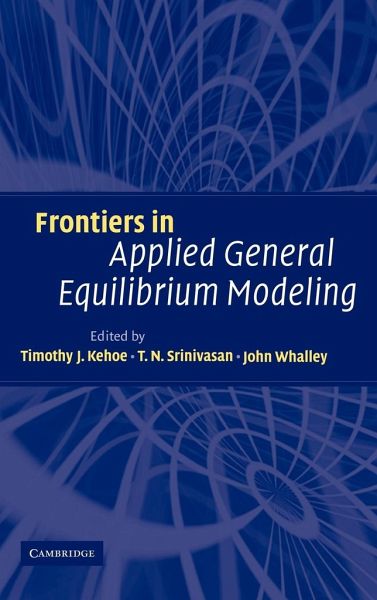
Frontiers in Applied General Equilibrium Modeling
In Honor of Herbert Scarf
Herausgeber: Srinivasan, T. N.; Whalley, John; Kehoe, Timothy Jerome

PAYBACK Punkte
52 °P sammeln!
Short description/annotationThis volume brings together twelve papers honoring Herbert Scarf and discussing new developments in applied general equilibrium.Main descriptionThis volume brings together twelve papers by many of the most prominent applied general equilibrium modelers honoring Herbert Scarf, the father of equilibrium computation in economics. It deals with new developments in applied general equilibrium, a field which has broadened greatly since the 1980s. The contributors discuss some traditional as well as some newer topics in the field, including non-convexities in economy-wide ...
Short description/annotation
This volume brings together twelve papers honoring Herbert Scarf and discussing new developments in applied general equilibrium.
Main description
This volume brings together twelve papers by many of the most prominent applied general equilibrium modelers honoring Herbert Scarf, the father of equilibrium computation in economics. It deals with new developments in applied general equilibrium, a field which has broadened greatly since the 1980s. The contributors discuss some traditional as well as some newer topics in the field, including non-convexities in economy-wide models, tax policy, developmental modeling and energy modeling. The book also covers a range of new approaches, conceptual issues and computational algorithms, such as calibration and new areas of application such as macroeconomics of real business cycles and finance. An introductory chapter written by the editors maps out issues and scenarios for the future evolution of applied general equilibrium.
Table of contents:
Introduction Timothy J. Kehoe, T. N. Srinivasan and John Whalley; Part I. General Equilibrium Theory: 1. Personal reflections of applied general equilibrium models Kenneth J. Arrow; 2. Uniqueness of equilibrium in the multi-country Ricardo model Herbert Scarf and Charles A. Wilson; Part II. Computational Methods: 3. Solving dynamic stochastic competitive general equilibrium models Kenneth L. Judd; 4. Mathematical programs with equilibrium constraints: automatic reformulation and solution via constrained optimization Michael C. Ferris, Steven P. Dirske and Alexander Meeraus; Part III. Macroeconomics and Finance: 5. Non-convexities in quantitative general equilibrium studies of business cycles Edward C. Prescott; 6. Lotteries for consumers versus lotteries for firms Lard Ljungqvist and Thomas J. Sargent; 7. Default and aggregate fluctuations in storage economies Makoto Nakajima and José Víctor Ríos Rull; 8. Frontiers in general equilibrium applied to finance Aloisio Araujo and Mario Pascoa; Part IV. Public Finance, Development and Climate Change: 9. Efficient taxation of income Dale W. Jorgenson and Kun-Young Yun; 10. Representatives versus real households in the macroeconomic modeling of inequality François Bourguignon, Anne-Sophie Robilliard and Sherman Robinson; 11. General equilibrium modeling for global climate change Alan S. Manne; Part V. General Equilibrium Restrictions and Estimation of Hedonic Models: 12. Simulation and estimation of hedonic models James Heckman, Rosa Matzkin and Lars Nesheim; Part VI. Policy Uses and Performance of AGE Models: 13. An evaluation of the performance of applied general equilibrium models of the impact of NAFTA Timothy J. Kehoe; 14. Decompositional analysis using numerical equilibrium models: illustrations from trade literature Lisandro Abrego and John Whalley; 15. The influence of computable general equilibrium models on policy Shatayanan Devarajan and Sherman Robinson.
This volume brings together twelve papers honoring Herbert Scarf and discussing new developments in applied general equilibrium.
Main description
This volume brings together twelve papers by many of the most prominent applied general equilibrium modelers honoring Herbert Scarf, the father of equilibrium computation in economics. It deals with new developments in applied general equilibrium, a field which has broadened greatly since the 1980s. The contributors discuss some traditional as well as some newer topics in the field, including non-convexities in economy-wide models, tax policy, developmental modeling and energy modeling. The book also covers a range of new approaches, conceptual issues and computational algorithms, such as calibration and new areas of application such as macroeconomics of real business cycles and finance. An introductory chapter written by the editors maps out issues and scenarios for the future evolution of applied general equilibrium.
Table of contents:
Introduction Timothy J. Kehoe, T. N. Srinivasan and John Whalley; Part I. General Equilibrium Theory: 1. Personal reflections of applied general equilibrium models Kenneth J. Arrow; 2. Uniqueness of equilibrium in the multi-country Ricardo model Herbert Scarf and Charles A. Wilson; Part II. Computational Methods: 3. Solving dynamic stochastic competitive general equilibrium models Kenneth L. Judd; 4. Mathematical programs with equilibrium constraints: automatic reformulation and solution via constrained optimization Michael C. Ferris, Steven P. Dirske and Alexander Meeraus; Part III. Macroeconomics and Finance: 5. Non-convexities in quantitative general equilibrium studies of business cycles Edward C. Prescott; 6. Lotteries for consumers versus lotteries for firms Lard Ljungqvist and Thomas J. Sargent; 7. Default and aggregate fluctuations in storage economies Makoto Nakajima and José Víctor Ríos Rull; 8. Frontiers in general equilibrium applied to finance Aloisio Araujo and Mario Pascoa; Part IV. Public Finance, Development and Climate Change: 9. Efficient taxation of income Dale W. Jorgenson and Kun-Young Yun; 10. Representatives versus real households in the macroeconomic modeling of inequality François Bourguignon, Anne-Sophie Robilliard and Sherman Robinson; 11. General equilibrium modeling for global climate change Alan S. Manne; Part V. General Equilibrium Restrictions and Estimation of Hedonic Models: 12. Simulation and estimation of hedonic models James Heckman, Rosa Matzkin and Lars Nesheim; Part VI. Policy Uses and Performance of AGE Models: 13. An evaluation of the performance of applied general equilibrium models of the impact of NAFTA Timothy J. Kehoe; 14. Decompositional analysis using numerical equilibrium models: illustrations from trade literature Lisandro Abrego and John Whalley; 15. The influence of computable general equilibrium models on policy Shatayanan Devarajan and Sherman Robinson.




